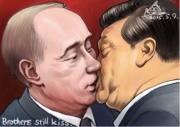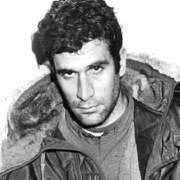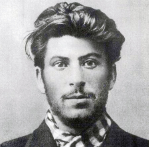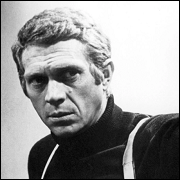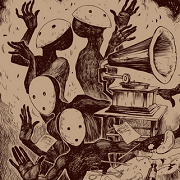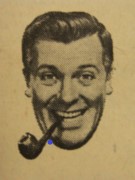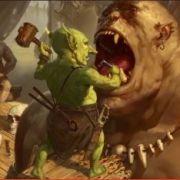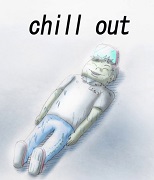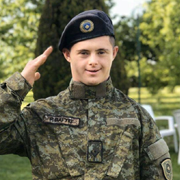- Amp
- Sep 10, 2010
-

|
New newsletter:
quote:
Twain at War
Everybody knows Mark Twain, but not everybody knows where he was during The War.
He was born in Missouri in 1835, so he would have been 26 when the war started in 1861. If you were from that generation, and especially if you were a white southerner, you were going to be asked the old question, “What did you do in the war?”
That was an awkward question for Twain. The short answer is that he skedaddled for California in 1861. His brother Orion was secretary of the Nevada Territory, which gave Twain a good excuse, but most Americans of that era would have guessed his age, wondered what he did in the war, and on finding out that he had done nothing at all — had spent The War scuffing around distant, war-free California and Nevada — would have concluded that he was a war-dodger.
This was a serious disgrace, and a lasting one. For example, James Thurber wrote in the 1930s about his grandfather, a veteran of Sherman’s March, and contrasted his grandfather’s pride in his service with the family legend about Cousin Zenas:
“Zenas had died in 1866. A sensitive, rather poetical boy of twenty-one when the Civil War broke out, Zenas had gone to South America - 'just,' as he wrote back, 'until it blows over.' Returning after the war had blown over, he caught the same disease that was killing off the chestnut trees in those years, and passed away. It was the only case in history where a tree doctor had to be called in to spray a person, and our family had felt it very keenly; nobody else in the United States caught the blight. Some of us have looked upon Zenas’ fate as a kind of poetic justice.”

As Thurber’s memoir shows, the stigma of dodging The War was a serious matter well into the 20th century. If you were a young man during the war, you were supposed to have enlisted and fought.
Twain hadn’t, as far as anyone knew. He became, after the war, a strong Unionist, which would have caused him some trouble among southerners, but not having fought at all must have caused him many an awkward moment even among northerners in New York and CN, where he lived.
When you’re asked the “What did you do in the war?” question by men your age who are missing an arm or a leg, you would naturally devote a lot of time to explaining why you’d gone to California, “just…until it blows over.”
Twain finally wrote about his war-dodging history in 1885, when he published “The Private History of A Campaign that Failed.”
It’s a very good, but very tricky essay, worth reading for its own sake — parts of it are very funny — but also as a good description of the confusion that reigned in Missouri in 1861, when the war started. Missouri, and especially the river towns where Twain, a young river pilot, made his living, was all over the map at the start of the war, and Twain does his usual excellent job of portraying that confusion.
But he’s also justifying his own failure to enlist, making an excuse for surviving, in fact. Not that Twain was likely to have felt what’s now called “Survivor’s Guilt." He seems to have felt that about something else, his brother’s death in a steamboat explosion, but not for dodging the war.
He had dodged the war for what he considered very good reasons, but reasons that weren’t easy to explain to contemporaries who’d risked everything to fight.
So the first thing Twain does is to state, like a good orator, why he has a right to speak on the matter. The essay begins,
“You have heard from a great many people who did something in the war; is it not fair and right that you listen a little moment to one who started out to do something in it, but didn’t? Thousands entered the war, got a taste of it, and then stepped out again, permanently. These, by their numbers, are respectable, and are therefore entitled to a sort of voice — not a loud one, but a modest one; not a boastful one, but an apologetic one. They ought not to be allowed much space among better people — people who did something — I grant that; but they ought at least to be allowed to state why they didn’t do anything, and to explain the process by which they didn’t do anything.”
It's a remarkable first paragraph. On the surface it’s all modesty, but the modesty is transparently false, because in 1885, when the essay was published, Mark Twain was the most popular literary celebrity in the U.S. — his masterpiece, Huckleberry Finn, had just been published — and had no need to apologize to anyone. When he gave humorous lectures or toasts (and he gave a lot of them), the audience “…were laughing at commas,” as Benchley once said about G. B. Shaw.
But under this modest tone is Twain’s real anxiety about The War. He’s in a difficult but promising rhetorical situation, facing hatred from other white southerners for deserting the Lost Cause, and scorn from northerners for simple cowardice. The rest of the memoir is Twain’s attempt to wedge himself a way out of these anticipated reactions.
Buried in this show of modesty is an interesting claim: That quite a lot of young men of military age (“These, by their numbers, are respectable…”) dodged the war. Thurber’s family shame at Cousin Zenas’s cowardice reflects the same memory of young men dodging the war.
Most northern men who didn’t want to join the war avoided enlisting by legal means, but quite a lot just made themselves scarce, as Zenas did:
“Over 160,000 individuals who did not avail themselves of such outlets also escaped the call to arms by refusing to report to their draft boards for examination. These men were illegal draft evaders by choice and deserters by law.”
So Twain is telling an awkward truth when he claims that he had a lot of company, northern as well as southern.
Rather than push this awkward truth, Twain returns to his stylized humble and humorous tone, asking only that he and the others who avoided serving “should be allowed to explain why they didn’t do anything...there was a good deal of confusion in men’s minds during the first months of the great trouble — a good deal of unsettledness, of leaning first this way, then that, then the other way. It was hard for us to get our bearings.”
This is another awkward fact. States like Missouri had a stake in the Union, since they depended, especially in river towns like Twain’s Hannibal, on trade up and down the river, which a war would destroy. Missouri convened a special legislative session and voted 98-1 against secession.
But Hannibal was in Marion County, which was part of a strip of northern Missouri called “Little Dixie,” settled by southern pro-secessionists.

We’ve talked on RWN about the wild story of Missouri during the first year of the war. There was a strong pro-Confederate elite, and only by mobilizing the St. Louis German population, who were uniformly pro-Union, could Nathaniel Lyons stop the state’s elite from pushing the state into the Confederacy. The pro-Confederate elite formed a rather sad “government in exile” with HQ in Marshall, Texas.
Twain illustrates the confusion of 1861 with a story about his experiences with a fellow cub pilot. The story may be true, and it may not, but Twain generally knew pretty well what he could get away with, so it certainly rang true for his audience:
“My pilot-mate was a New Yorker. He was strong for the Union; so was I. But he would not listen to me with any patience; my loyalty was smirched, to his eye, because my father had owned slaves. I said, in palliation of this dark fact, that I had heard my father say, some years before he died, that slavery was a great wrong, and that he would free the solitary negro he then owned if he could think it right to give away the property of the family when he was so straitened in means. My mate retorted that a mere impulse was nothing — anybody could pretend to a good impulse; and went on decrying my Unionism and libeling my ancestry.”
The New Yorker soon changes his mind, in lockstep with his community:
“A month later the secession atmosphere had considerably thickened on the Lower Mississippi, and I became a rebel; so did he. We were together in New Orleans, the 26th of January, when Louisiana went out of the Union. He did his full share of the rebel shouting, but was bitterly opposed to letting me do mine. He said that I came of bad stock—of a father who had been willing to set slaves free.”
Twain’s point, quietly insinuated, is that he and his co-pilot had no minds of their own worth mentioning; that they changed their minds with the prevailing “atmosphere.” That’s a cynical but accurate description of how most men of military age made their choices.
Writing in 1885, Twain can count on a broad, if lukewarm, consensus that slavery was “a great wrong,” so his friend’s willingness to smear his ancestry because his “father had been willing to set slaves free” makes the friend’s changing stance increasingly ludicrous. So this entire long illustration is not simply illustrating his friend’s shallowness, but implying that there was no moral sense undergirding such decisions.
Twain finishes the anecdote with the third and final stage of his friend’s political evolution:
“In the following summer he was piloting a Federal gun-boat and shouting for the Union again, and I was in the Confederate army. I held his note for some borrowed money. He was one of the most upright men I ever knew; but he repudiated that note without hesitation, because I was a rebel, and the son of a man who owned slaves.”
Twain implies several grim lessons via this anecdote. First, he implies that his friend’s allegiances were a matter of conforming to the prevailing “atmosphere,” so that when the Union won the battle for control of the Mississippi, the friend turned Union and, not coincidentally, got a job as a pilot again. That was a big deal, because as Twain explains at length in Life on the Mississippi, piloting was by far the best-paid job you could get in his part of the world.
Second, Twain begins to imply a distinction between his own hapless allegiances and those of his friend — because he chose the Confederate Army, which was never very successful on the Mississippi or its riverbank towns.
So Twain, though equally stupid, seems a little less venal than his friend.
Finally, he says his ex-friend welched on money he owed Twain. Sure, Twain says very clearly that his friend was “one of the most upright men I ever knew,” but Marc Antony said some nice things about Brutus in much the same way, with the same intention. You aren’t meant to take Twain’s defense of his friend seriously; you’re meant to think that his friend, who’s already been revealed as a facile conformist, couldn’t have been all that “upright” and, like those who say “it’s not the money, it’s the principle,” was really just cheap and dishonorable.
Of course, this sort of fickle allegiance-switching didn’t happen everywhere. If you were from Maine, you were going to fight for the Union if you fought at all. If you were from South Carolina, you were going to fight for the Confederacy.
If you were from Missouri, Kentucky, Maryland, or Tennessee, you might choose either side, but even in those states, the choice was rarely a matter of personal opinion. More often, it was a regional decision. East Tennessee meant pro-Union, Mississippi-River based towns in Missouri (like Hannibal) meant Confederate, while St-Louis German meant Union. But it’s worth remembering that every state of the Confederacy, except South Carolina, had at least one unit of white residents serving in the Union army.
Units of the USCT (African-American ex-slaves) were raised in SC late in the war, but not one unit of white South Carolinians was formed in the whole course of the war. That state was something special, a very strange place.
Twain, as a child from the Little Dixie part of Missouri, would naturally follow the local herd of cattle into the Confederate ranks, as he confesses he did. He goes on to confess, in this essay, that he tried to be a Confederate for only a month, then lit out for the West. This puts him in an awkward spot in 1885, confessing to having tried to fight for the losing side, and worse (much worse as the Lost Cause narrative made it acceptable to have fought bravely for the Confederacy) having deserted from it as well.
The rest of the essay relies on the points made in the story of Twain’s changeable friend: That he and the rest of his demographic were young, stupid, fickle, and generally deluded. The best thing about this characterization of his demographic is that stupid, fickle, deluded people are great comedy material. Twain relies on this comedy to keep his audience, likely to be wary of a draft-dodger’s self-justifications, sufficiently entertained to go along with him.
Is Twain’s account of his service true? I don’t know, and AFAIK no one else does. Most commentators simply accept it as true, a dangerous move.
My guess is that they’re like the stories in Papillon or other popular memoirs: some literally, autobiographically true, some borrowed from other people’s stories, some just plain made up.
Most likely, the bulk of it is more or less true, just because Twain was a born storyteller and such people generally start with the more slapstick events in their past and riff them up a bit.
For example, Twain tells a brilliant story about the name his comrades chose when they formed their Confederate volunteer unit. This story will seem familiar to those who remember Huck’s account of the “Pirate Band” in Huckleberry Finn (HF, Chapter II, “Our Gang’s Dark Oath”) but that doesn’t mean it’s necessarily made-up. He just had a gift for that kind of take-down:
“…we called ourselves the Marion Rangers. I do not remember that any one found fault with the name. I did not; I thought it sounded quite well. The young fellow who proposed this title was perhaps a fair sample of the kind of stuff we were made of. He was young, ignorant, good-natured, well-meaning, trivial, full of romance, and given to reading chivalric novels and singing forlorn love-ditties. He had some pathetic little nickel-plated aristocratic instincts, and detested his name, which was Dunlap; detested it, partly because it was nearly as common in that region as Smith, but mainly because it had a plebeian sound to his ear.
"So he tried to ennoble it by writing it in this way: d’Unlap. That contented his eye, but left his ear unsatisfied, for people gave the new name the same old pronunciation—emphasis on the front end of it. He then did the bravest thing that can be imagined,—a thing to make one shiver when one remembers how the world is given to resenting shams and affectations; he began to write his name so: d’Un Lap. And he waited patiently through the long storm of mud that was flung at this work of art, and he had his reward at last; for he lived to see that name accepted, and the emphasis put where he wanted it, by people who had known him all his life, and to whom the tribe of Dunlaps had been as familiar as the rain and the sunshine for forty years.”
Ah, what fine insidious comedy in this story! It gets the laughs while reinforcing Twain’s very grim thesis about his demographic: “young, ignorant, good-natured, well-meaning, trivial, full of romance, and given to reading chivalric novels…”
Above all, Twain implies that people are so stupid that they can disable their memories, as when people “…to whom the tribe of Dunlaps had been as familiar as the rain and the sunshine” when faced with a Big Lie — that the name is actually an ancient, aristocratic French one, “d’Un Lap.”
Twain’s hatred for “chivalry” as it was understood in the South shows up in everything he wrote, from Huck Finn to A Connecticut Yankee in King Arthur’s Court. He names the wrecked riverboat in Huck Finn the Sir Walter Scott (HF Chapter VIII, “Honest Loot from the Walter Scott”), and his hate for Scott’s “chivalrous” novels was white-hot:
“Then comes Sir Walter Scott with his enchantments, and by his single might checks this wave of progress, and even turns it back; sets the world in love with dreams and phantoms; with decayed and swinish forms of religion [Not fond of Cat’lics, Twain wasn’t]; with decayed and degraded systems of government; with the sillinesses and emptinesses, sham grandeurs, sham gauds, and sham chivalries of a brainless and worthless long-vanished society. He did measureless harm; more real and lasting harm, perhaps, than any other individual that ever wrote.”
That’s why Twain ends Connecticut Yankee by electrocuting the entire “chivalry” of England in their iron armor. It’s meant to be a happy ending.

And of course it’s not fair at all to Scott, a hard-working and competent novelist. And if one were to make a serious attempt to rank Victorian novelists by the harm they did…well, where would you even start?
I talked about this in RWN Newsletter #100, but it’s a tough call. Do Thackeray’s vicious caricatures of the oppressed count for more than Dickens’s clever non-mention of them? Hard to say, but silence is generally a better cover for mass death than vituperation.
Compared to either of those writers, Scott seems relatively harmless — as long as we’re talking about the effect of his work in Britain. Because that’s not what Twain is really angry about. What he hates so violently is the effect of Scott’s novels in the American south, a very different matter.
In the American south, Scott’s novels had a very different effect. They helped to convince a small, powerful clique of lowland farmers who got obscenely rich off slave labor that they were “cavaliers,” a term they borrowed from Scott’s novels without a clue about its real contexts.
It’s a shame that these South Carolina cotton farmers couldn’t have socialized with the real 17th c. Cavaliers. The snubs would have been violent enough to raise a mushroom cloud over Charleston.
As it was, the planter class of the south invented itself as the uninvited heirs of the Cavaliers, and extrapolated from it that they were braver, nobler, finer in their manners and above all better fighters than the Puritans of the North. Which was odd, because the actual Roundheads crushed the actual Cavaliers time after time — but you often get these reactionary cliques idolizing losing armies, like the Wehrmacht and, a few decades after its surrender, the CSA itself.
Twain’s unit (if you can call it that), the “Marion Rangers,” soon marches out of Hannibal, looking for the war. They never quite find it, partly because they don’t really want to.
Twain calls them a “herd of cattle,” and he means it, because his grim thesis throughout the essay is that people are too stupid to be held to account — a herd species, gregarious to a fault, like cattle:
“What could you expect of them? They did as well as they knew how, but really what was justly to be expected of them? Nothing, I should say. That is what they did.”
Twain is not kidding at all. He always spoke of his work as "preaching," and what he preached was something close to nihilism. The humor was the spoonful of sugar that helped this nasty-tasting medicine go down, as he said himself:
“I have always preached...If the humor came of its own accord and uninvited, I have allowed it a place in my sermon, but I was not writing the sermon for the sake of humor. I should have written the sermon just the same whether any humor applied for admission or not.”
Twain’s sermon in this essay sweetens up its audience for a while, then gets to the point when the “Marion Rangers” kill a stranger coming down the road at night, out of fear. They don’t know who he was, and they weep over the body, as stupid and sentimental as ever.
Twain does a beautiful job of changing tone here. One minute he’s telling the story of his comrades’ battle with the rats in the corn-crib where they were staying:
“…the place was full of rats, and they would scramble over the boys’ bodies and faces, annoying everybody, and now and then they would bite someone’s toe, and the person who owned the toe would…throw corn in the dark. The ears were half as heavy as bricks, and when they struck they hurt. The persons struck would respond, and inside of five minutes every man would be locked in a death-grip with his neighbor. There was a grievous deal of blood shed in the corn-crib, but this was all that was spilt while I was in the war.”
You can imagine the audience’s delight with this typical Twain story, just a bunch of lunkheads having a corn-cob fight in the dark. That’s where he wants his audience when he zaps them with this transition:
“No, that is not quite true. But for one circumstance it would have been all. I will come to that now.”
There’s nothing as disarming as a good laugh, and Twain wants the audience disarmed at this point, because everything is going to change. He’s riffed hilariously on the Marion Rangers’ cowardice, ineptness — it was news to me that small-town youths like these didn’t know how to ride horses, for example:
“We were town boys, and ignorant of horsemanship…We did learn to ride, after some days’ practice, but never well.”
But the humor is always at the service of the sermon, and the sermon starts with that deft transition about the one other time that blood was shed, the non-humorous incident.
The Hannibal boys have ducked possible combat many times, moving from place to place every time they hear a rumor that Union troops were in the area, prompting one farmer to remark, “Marion Rangers! Good name, b’gosh!” and suggesting that they “…could be counted on to end the war in time, because no government could stand the expense of shoe-leather it would cost trying to follow us around.”
It's this sheer cowardice that leads them to murder a stranger. They’re always hearing rumors of Union advances, but they eventually stop taking them seriously, out of sheer retreating-fatigue, and decide to stay where they are: “…the enemy was [said to be] hovering in our neighborhood. We said let him hover.”
Then they get scared again, and take up watch in the darkness. They can hear hoofbeats, and see,
“…a man on horseback; and it seemed to me that there were others behind him…Somebody said ‘Fire!’ I pulled the trigger. I seemed to see a hundred flashes and hear a hundred reports, then I saw the man fall down out of the saddle. My first feeling was of surprised gratification; my first impulse was an apprentice-sportsman’s impulse to run and pick up his game.”
The Rangers wait for the attack of the other riders, and soon realize there were none. They’ve killed a lone horseman. They creep up to the body:
“When we got to him the moon revealed him distinctly. He was lying on his back, with his arms abroad; his mouth was open and his chest heaving with long gasps, and his white shirtfront was all splashed with blood.”
This is the moment everything in the essay shifts radically. As Melville wrote after the battle of Shiloh, “What like a bullet can undeceive?”
The Marion Rangers are undeceived by their own volley of shotgun pellets, and switch from fierce soldiers to mourners in a second:
“The thought shot through me that I was a murderer; that I had killed a man — a man who had never done me any harm…I was down by him in a moment, helplessly stroking his forehead; and I would have given anything — my own life freely — to make him again what he had been five minutes before. And all the boys seemed to be feeling in the same way; they hung over him, full of pitying interest, and tried all they could to help him, and said all sorts of regretful things.”
The Rangers never find out who the man was — or at least that’s the way Twain tells it. No one in the area knows him. He wasn’t wearing a uniform, and wasn’t armed.
Now Twain is ready to preach his sermon without disguise:
“The thought of him got to preying upon me every night; I could not get rid of it…And it seemed an epitome of war; that all war must be just that — the killing of strangers against whom you feel no personal animosity…My campaign was spoiled.”
That short, blunt sentence, “My campaign was spoiled,” recalls the title of the essay and echoes back, through the seemingly modest opening paragraphs, forcing the reader to reevaluate Twain’s humble confession that he “did nothing.” If this is war, then doing nothing is the better choice.
But the sermon detonates in the reader’s mind only after Twain’s long and very funny account of his slapstick early service. There’s plenty of room for the audience, which may include maimed veterans, prone to outrage, the respect they’re accustomed to get: “It seemed to me…that war was intended for men, and I for a child’s nurse.”
Twain ends the essay with another punchline — one of the weakest in the essay:
“There was more Bull Run material [i.e. rookie soldiers prone to flight] than exhibited itself at Bull Run. And yet it learned its trade presently, and helped to fight the great battles later. I could have become a soldier myself, if I had waited. I had got part of it learned; I knew more about retreating than the man that invented retreating.”
That’s the end of the essay, and the feebleness of the joke is intriguing. It ranks last, a distant last, in all the punchlines of the essay. Some of the others are truly hilarious, like the story of the Rangers’ battle with the farmer’s dogs. Yet Twain ends with this formulaic line about retreating.
When a writer as good as Twain saves, not his best, but his worst punchline for last, you have to wonder why.
My own guess, and it’s just a guess, is that Twain the preacher, who happened to be a gifted humorist, wants to send the audience away with a joke, but not a very good or memorable joke, because as he confessed, the sermon itself is his real point. He’s a humorist; that’s his job, and he has to end with a joke. But having turned the battle from a humble self-defense for his own cowardice into the strong implication that shunning the war was in fact the nobler course, he doesn’t want that final joke to overwhelm the sermon. It’s a marker to the audience, “Here, here’s your obligatory final punchline; here endeth the sermon.”
So the essay ends with an intentionally vague message. If you were in a Northern, pro-Union audience (as Twain’s primary audience was when he wrote this essay), would you feel that Twain was criticizing you and your relatives as well as his own Hannibal “town boys”? Would an audience that cherished the memory of Gettysburg feel that they shared the blood guilt of the Marion Rangers?
I suspect not. There are too many pointers in the essay suggesting that blame for the war veered south. First, the use of “slavery” as the test issue in his long opening anecdote about his fickle fellow pilot. There’s no sign that this colleague had any sense of the immorality of slavery, but Twain’s family clearly did. He never varies on that point.
Then there’s the characterization of the dimly-seen Union forces. Twain mentions that one such force was led by Ulysses Grant, whose memoirs Twain had edited (and co-written, if you ask me).
Finally, there’s the effect of the many tales of Walter-Scott like fancy, exemplified by Dunlap, aka “d’un Lap,” “the mongrel child of philology,” who invents the name “Marion Rangers” and continues his fanciful naming of every camp the Rangers occupy in their endless retreat: “[Dunlap] proved useful to us in his way; he named our camps for us, and he generally struck a name that was ‘no slouch,’ as the boys said.”
This impulse to impose a chivalrous, ridiculous nomenclature on the landscape of rural Missouri was the same one that Twain excoriated, to the point of abandoning all attempt at humor, in his loathing for Sir Walter Scott’s role in the mass delusion that Twain considered the Confederacy to have been.
This idea was clearly in his mind in the 1880s. It’s the theme of one of the grimmest and least amusing chapters of Huckleberry Finn, Chapter XXII, in which Colonel Sherburn, after killing a harmless drunk who offended his southern honor, faces down a would-be lynch mob and addresses them at length, denouncing their delusion that they’re a brave, fierce people and dismissing them with a contemptuous “Now git!”
So Twain probably meant the essay to resonate in a carefully circumscribed manner, sparing the Unionists, who had never boasted as the proto-Confederates had and had gone to war in a less deluded, less euphoric mood, as something they considered duty but were not especially looking forward to.
But the essay clearly means to echo beyond the Confederacy. Twain’s Rangers are, as he says, “a fair sample” of the human material with which wars are made: “There were scores of little camps scattered over Missouri where the same thing was happening.”
And he makes clear, several times in the essay, that, ridiculous as they were in their rookie outing, they learned the trade of war all too well:
“One might justly imagine that we were hopeless material for war. And so we seemed, in our ignorant state; but there were those among us who afterward learned the grim trade; learned to obey like machines; became valuable soldiers; fought all through the war, and came out at the end with excellent records.”
In fact, not all of the Rangers “came out at the end” of the war at all. One of the Hannibal boys, introduced as a “vast donkey,” turned into such a good soldier that “he stuck to the war, and was killed in battle at last.”
It’s a remarkably deft essay, navigating a course trickier than any low-water Mississippi-scape Twain ever piloted in his youth, and doing it with some of the funniest war stories ever told. Still, you can see why Twain ended up cursing life in general and recommending that souls in danger of being born choose oblivion while they can.
##
—War Nerd
|








